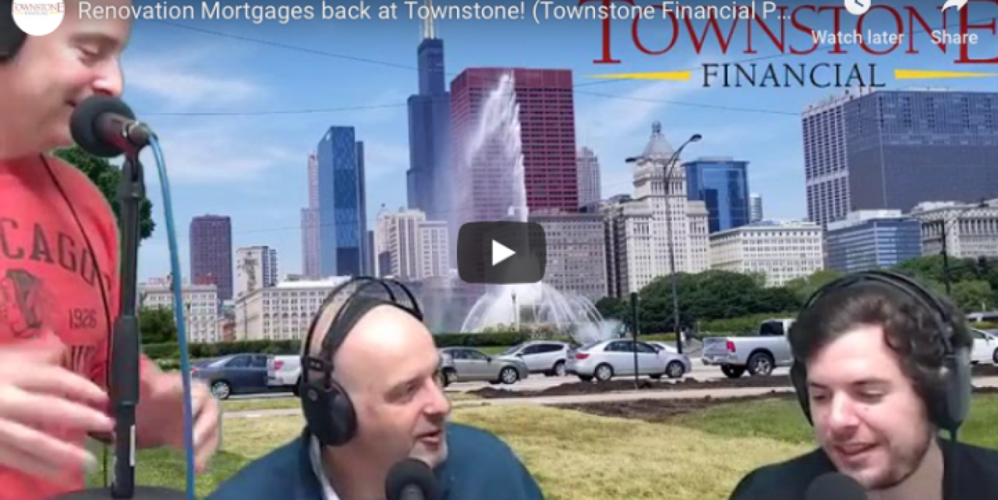
Townstone Financial radio show image
A federal judge has sided with left-wing activist groups and denied a request from the Trump administration to undo a settlement under which Chicago area mortgage broker Townstone Financial agreed to pay $105,000 to end a regulatory action, even though federal officials say the action was the result of unconstitutional decisions by federal agents to target the brokerage over its executives' disfavored speech.
On June 12, U.S. District Judge Franklin U. Valderrama said the settlement represented a "final judgment" and he would not allow the federal government to refund the penalties paid by Townstone, because to grant the "unprecedented" request now would create future legal headaches for the courts.
In the ruling, Valderrama agreed with progressive activists who opposed the government's attempt to vacate the settlement that "granting the Motion would erode public confidence in the finality of judgments."
"It would set a precedent suggesting that a new administration could seek to vacate or otherwise nullify the voluntary resolution of a case between a prior administration (or the same administration ,but under different agency leadership) and a private party merely because its leadership thought the original litigation unwise or improperly motivated," Valderrama wrote. "That is a Pandora’s box the Court refuses to open."
In the motion, the CFPB said the request came after a review of past regulatory actions revealed regulators had "targeted" Townstone "because of its protected speech. In the filing, the CFPB said the review had come under an order from President Trump directing federal agencies to screen past actions for improper political motivations.
The CFPB and Townstone had reached a deal last fall, just before the presidential election, appearing to end a years-long court fight.
In the legal battle, Townstone had repeatedly asserted the regulatory action amounted to an unconstitutional assault by federal agents, wielding a financial and banking anti-discrimination law as a weapon to target them for what they say should have been their constitutionally protected speech.
The CFPB had launched the action against Townstone four years earlier, in the final days of the first administration of President Trump. The CFPB had accused Townstone officials, including Townstone's president Barry Sturner of effectively discriminating against black borrowers through comments Sturner and other company executives had made several years earlier on Townstone-created radio infomercials.
The CFPB never accused Townstone of actual discrimination against any potential borrowers on the basis of race or any other protected characteristic.
Instead, the CFPB asserted the comments, made in passing by Sturner and others on the radio, could "discourage" black prospective borrowers from applying for loans through Townstone.
The CFPB further accused Townstone of not employing enough black loan officers and of not sufficiently advertising its products and services to potential black borrowers.
According to court documents, the alleged discriminatory statements included:
- In January 2017, Townstone CEO Barry Sturner allegedly related his experiences shopping at “the Jewel on Division” in Chicago. He referred to that particular supermarket as “Jungle Jewel,” adding: “There were people from all over the world going into that Jewel. It was packed. It was a scary place;”
- In June 2016, Sturner, in discussing “mortgage-lending services that Townstone could provide to police officers and others” described weekends on the South Side of Chicago as “hoodlum weekend,” adding: Police are “the only ones between that turning into a real war zone and keeping it where it’s kind of at;”
- In November 2017, during a discussion of skydiving and the resulting adrenaline “rush” that follows, a Townstone executive allegedly “suggested that ‘walking through the South Side at 3 a.m. [would] get the same rush;’”
- In January 2014, in giving advice on how to get a home ready for sale, a former Townstone executive and co-hosts of the Townstone show said home sellers should “change the light fixtures, paint it from top to bottom,” and “take down the Confederate flag;” and
- In January 2014, Townstone’s former president allegedly told a caller from Markham, a suburban community with a large Black population, that “it’s crazy in Markham on weekends,” and “You drive very fast through Markham … you don’t look at anybody or lock on anybody’s eyes in Markham … You look at your dashboard, you don’t lock on anybody.”
Sturner and Townstone, with their attorneys from the nonprofit constitutional legal advocacy organization, the Pacific Legal Foundation, had contested the CFPB's action, accusing the agency of an "absurd" and unconstitutional interpretation of the Equal Credit Opportunity Act. They said the CFPB was not trying to use the action to remedy any actual discrimination, but instead sought to use the law to silence speech federal agents find objectionable.
According to court documents, Sturner and Townstone had sought throughout the case to gain access to documents and other records from the CFPB which could provide insight into why the agency selected Townstone for the enforcement action.
Those requests were either denied or stonewalled, ultimately leading the defendants to agree to settle, rather than continue to attempt to fight the action and potentially face a more costly conclusion after exhausting even more time and money defending against the case and the CFPB's relatively limitless resources.
Under the settlement, Sturner and Townstone agreed to pay a $105,000 fine and to submit to diversity and anti-discrimination "education" for its executives and staff.
The decision to settle was reinforced by a ruling from the U.S. Seventh Circuit Court of Appeals, which had ruled the anti-discrimination language in federal law cited by the CFPB should extend not only to actual mortgage applicants, but "prospective applicants," as well. The court said the CFPB should have the authority to regulate lenders' speech, should it be perceived to discourage black home buyers from applying for mortgages.
However, after Trump was inaugurated to his second term, the CFPB reviewed the settlement and told the court they uncovered evidence the action had been the result of a desire to punish and make an example of the lenders "based on (their) expressed political views," particularly in the wake of racial unrest and rioting following the death of George Floyd in May 2020.
They said the settlement should be vacated out of a desire to uphold the First Amendment and on the principle "that no agency is entitled to target individuals based on their views simply because the agency might be able to get away with it through attrition."
In response, however, a group of left-wing activist groups sought to intervene in the matter and force the government to keep the settlement in place.
That intervention was supported by a list of 14 groups, including: the National Fair Housing Alliance; Public Citizen; the American Civil Liberties Union; Better Markets; Chicago Lawyers' Committee for Civil Rights; Consumer Federation of America; Fair Housing Center of Central Indiana; HOPE Fair Housing Center; Metropolitan Milwaukee Fair Housing Council; National Association of Consumer Advocates; National Consumer Law Center; Open Communities; and South Suburban Housing Center.
In their filing, the groups asserted the CFPB lacks the legal authority to retract the settlement now, simply because "new agency leadership (are) looking to separate themselves ideologically from the political leadership of the prior administration..."
They argued the reversal would set a precedent under which companies and other targets of regulatory enforcement actions could petition new presidential administrations "every four or eight years" to renegotiate or vacate settlements of past investigations and prosecutions "to secure a better deal - or escape the previously negotiated deal entirely - based merely on the inauguration of a new president and appointment of new agency leadership."
The CFPB and Townstone agreed vacating the settlement could break new legal ground. But they said the organizations' claims of future harm were "baseless," particularly in light of the evidence showing the government had intentionally targeted a private business and individuals for punishment over their speech.
"The desire for finality in judgments should not prevent this Court from vacating a judgment when the government is admitting to institutional failures that led to a violation of constitutional rights...," the CFPB wrote.

U.S. District Judge Franklin U. Valderrama
Valderrama, however, said those potential constitutional violations were not good enough to upset the "final judgment" established under the settlement and Townstone should still pay.
Valderrama noted the action had begun during Trump's first term, "not under some previous administration."
"Presumably, CFPB launched the lawsuit after it determined that there was a legal and factual basis for the suit. Apparently, that was not the case. Now, current CFPB leadership under the second Trump administration, in an act of legal hara-kiri that would make a samurai blush, falls on the proverbial sword and attests that the lawsuit lacked a legal or factual basis," Valderrama wrote.
And Valderrama agreed that "it is impermissible for government agencies to target people or entities because of protected speech."
The judge, however, said no court proceedings established that the CFPB had violated any of Townstone's rights, regardless of Townstone's claims that the CFPB under the Biden administration had repeatedly blocked them from obtaining the evidence to prove they had been targeted.
He called the CFPB's and Townstone's claims of unconstitutional targeting "breathtaking, but unpersuasive."
Instead, the judge said Townstone's decision to enter into the settlement "voluntarily" defeats their attempt to undo the settlement now.
"The voluntary nature of the resolution of this case cannot be overemphasized. It was only after a change at the leadership at CFPB that CFPB now seeks - along with Defendants (Townstone and Sturner) - to unwind the very settlement and consent decree that it negotiated," Valderrama wrote.
"... At bottom, to grant the Motion based on the arguments advanced by the Parties would be to undermine the finality of judgments. This, the Court declines to do."
Following the ruling, Pacific Legal Foundation attorney Steven M. Simpson, who represented Townstone, said they have not yet decided if they will appeal Valderrama's ruling.
“The court, like many in the media, seemed fixated on the actions of two Trump administrations in this case," Simpson said in an emailed statement to The Record.
"Lost in the shuffle is evidence of an agency bent on punishing a company for its speech. We hope Congress is willing to take a closer look at the case.
"We are evaluating our options, and we look forward to continuing to fight for ultimate justice for our client."
The activists are represented by Joshua Karsh, of Mehri & Skalet, of Evanston; and Karla Gilbride, of Public Citizen Litigation Group, of Washington, D.C.
Townstone and Sturner are represented by Simpson and attorneys Ashley Torkelson Levine and Oliver J. Dunford, of the Pacific Legal Foundation, of Arlington, Virginia, and Palm Beach Gardens, Florida; Sean P. Burke, of Mattingly Burke Cohen & Biederman, of Indianapolis; and attorney Marx David Sterbcow, of New Orleans.






